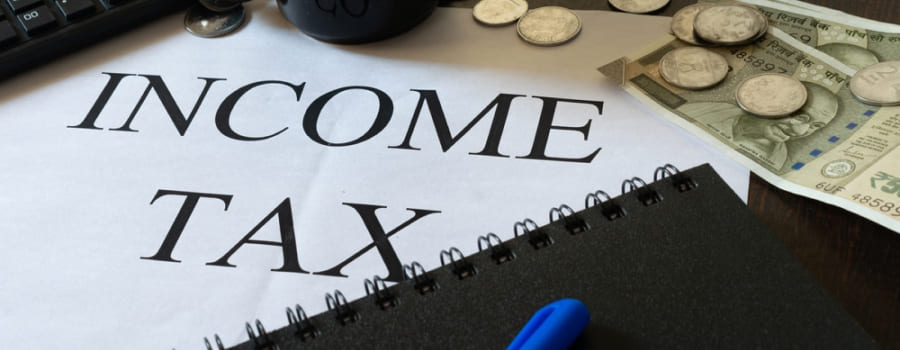Tax* saving is an important financial objective. There are different provisions present in the Income Tax Act, 1961 to help you reduce the taxable income. And Section 16 is one such important provision that is a tax-saving benefit for your salary income. It is important to understand these provisions to make the best use of the allowable deductions under the Income Tax Act for receiving maximum benefits as a taxpayer. So, here is a detail to help you understand Section 16.
What Is Income Tax Section 16?
Section 16 of the Income Tax Act details three different types of tax deductions allowable in your salary income. These deductions help revise your taxable income to reduce the tax liability.
The deductions are as follows:
- Standard deduction
- Deduction on entertainment allowance paid by your employer
- Deduction on the professional tax of the salary income
- Standard deduction under Section 16(ia) - Under Section 16(ia), the standard deduction is a flat deduction allowed on your salary income. It replaced the transport and medical allowance deductibles and was introduced by the Government in the Union Budget of 2018. The standard deduction amount allowable was ₹40,000. You can reduce this amount from your salary income to derive the taxable income.
In the Interim Budget 2019, the limit for standard deduction is increased to ₹50,000 to provide better tax relief. Therefore, from FY 2021-22 and further future years, the standard deduction is limited to ₹50,000 until any changes. The standard deduction will not be applicable if you choose the new regime slab rates.
The standard deduction under Section 16(ia) is also applicable for retired individuals having a pension income. As the pension is chargeable to tax under the head - Income from salary, the standard deduction of ₹50,000 on such pension income is allowable every financial year.
However, if the salary income is less than ₹50,000, the standard deduction allowable will be equal to the salary income. Therefore, the standard deduction is ₹50,000 or the salary income, whichever is lesser. It is important to note that the standard deduction does not affect or relate to any other tax deduction provisions under the Income Tax Act. 1961.
Illustration of calculation of the standard deduction:
- Other taxable allowances - ₹50,000
- Gross salary - ₹6,50,000
- Standard deduction - ₹50,000
- Total income - ₹6,00,000
- Other deductions - ₹1,50,000
- Taxable Income -₹4,50,000
- Deduction on entertainment allowance under Section 16(ii) - If your employer provides an entertainment allowance, it gets included in your gross salary added to your salary income. However, the deduction stated under Section 16(ii) allows you to claim a tax deduction on the same entertainment allowance.
And the deduction is based on the nature of your employment.
- If you are a government employee belonging either to the Central or State government, the deduction on entertainment allowance under Section 16(ii) is the lowest of the following:
- ₹5000
- 20% of the basic salary
- Actual entertainment allowance received
- It is a deduction allowable when your salary does not include any other allowances, benefits, or perquisites provided by your employer. Also, it is based on the amount you receive as an entertainment allowance and not on the amount you spend for entertainment purposes.
- If you are not a government employee, there is no allowable deduction on the entertainment allowance applicable to your salary income. Therefore, if your employer provides an entertainment allowance, it will be added to your taxable income.
Illustration of calculation of deduction for entertainment allowance:
- Salary excluding allowances, benefits, and perquisites-₹4,00,000
- Entertainment allowance per month-₹3000
- Entertainment allowance for the year-₹36000
- Amount of deduction:
- ₹5000
- 20% of salary - ₹80,000
- Actual amount - ₹36,000
The least of the above is ₹5000. Therefore, the deduction allowable on the entertainment allowance is ₹5000.
- If you are a government employee belonging either to the Central or State government, the deduction on entertainment allowance under Section 16(ii) is the lowest of the following:
- Deduction on the professional tax under Section 16(iii)- Professional tax is applicable on your salary income and becomes a part of your tax liability. However, Section 16(iii) of the Income Tax Act, 1961 provides a tax deduction based on the following aspects:
Let us understand the provisions of Section 16 Income Tax Act in a little detail.
- The deduction will apply to your salary income for the financial year you have paid the professional tax.
- If your employer pays the professional tax, it will be a part of the perquisites while calculating the gross salary. After that, you can claim the professional tax paid by the employer under Section 16(iii) of the Income Tax Act, 1961.
- There is no defined limit stated for the deduction of professional tax. Therefore, the amount of professional tax you pay will qualify for the deduction entirely irrespective of the amount.
- If you are liable to pay the penalty or interest amount on the professional tax, such amounts will not be allowed for the deduction.
Conclusion
As a responsible taxpayer, you need to be aware of the tax provisions on your salary income to utilise the benefits maximally. Section 16 of the Income Tax Act, 1961 provides a standard deduction and other deductions on entertainment allowance and professional tax. However, a few aspects need special consideration while accounting for the applicability of the specific tax provision. Understand them rightly or take professional advice while seeking such provisions to ascertain the tax benefit!
L&C/Advt/2022/Dec/3070







 FOR EXISTING POLICY
FOR EXISTING POLICY 
 FOR NEW POLICY
FOR NEW POLICY 




